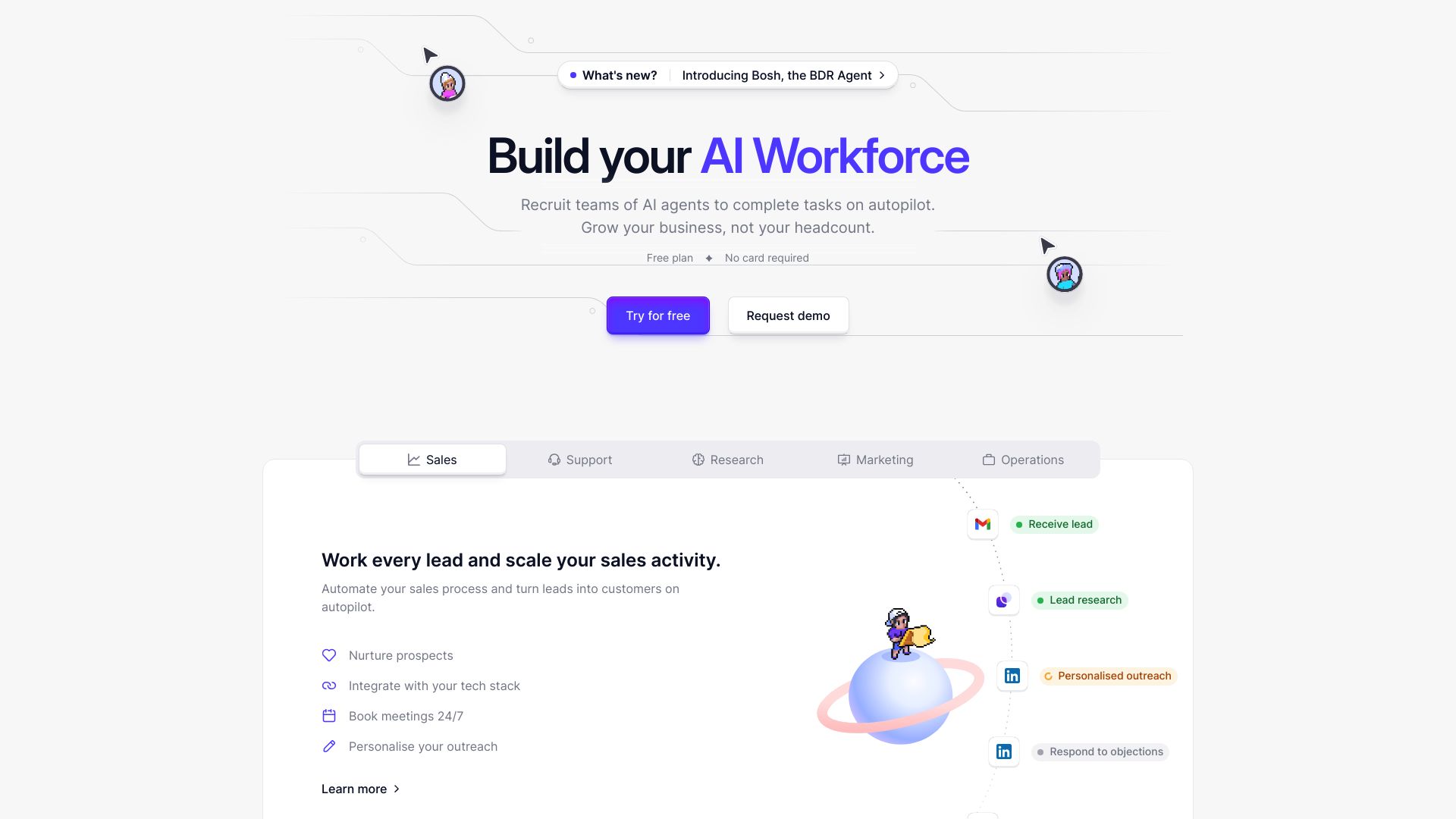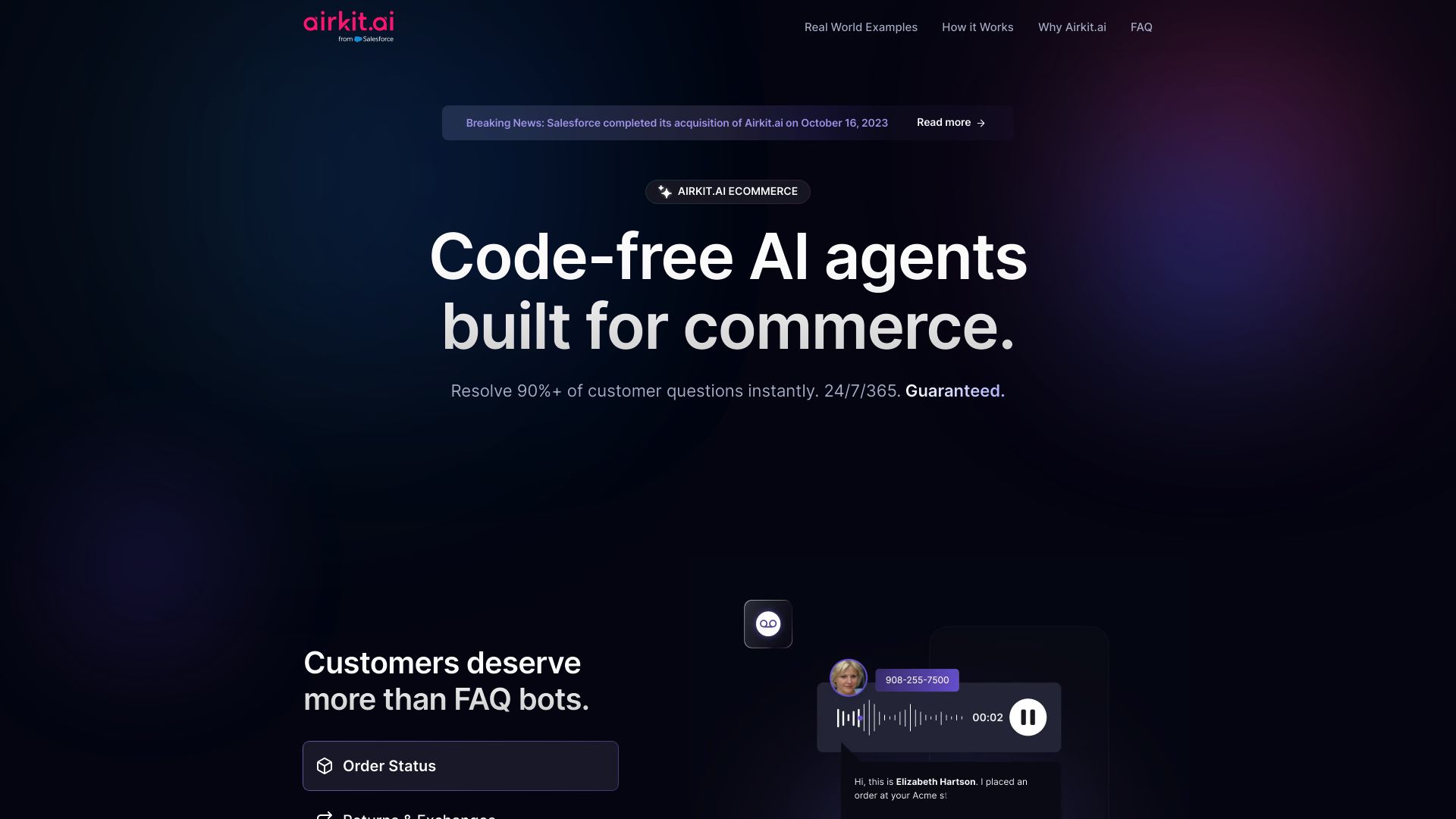Relevance AI vs. Airkit AI: A Comprehensive Comparison for AI Agent Development
AI agent platforms revolutionize how businesses automate tasks and enhance customer interactions. This comparison examines Relevance AI vs. Airkit AI, two powerful solutions for building intelligent agents. Relevance AI offers a flexible, low-code environment for creating custom AI agents across various domains. Airkit AI, recently acquired by Salesforce, specializes in rapid deployment of customer service automation for ecommerce. We’ll explore their key features, strengths, and limitations to help you determine which platform best suits your AI development needs. Additionally, we’ll introduce SmythOS, our cutting-edge solution that combines versatility, ease of use, and advanced capabilities to deliver unparalleled value in AI agent creation and deployment.
Relevance AI Overview
Relevance AI empowers users to build and deploy AI agents and tools with minimal coding. The platform caters to developers, business leaders, and non-technical professionals seeking to harness AI capabilities for various applications.


Relevance AI’s low-code environment allows users to create custom AI agents and tools within minutes. The platform supports multiple Large Language Model providers, offering flexibility in AI model selection. A built-in vector store enhances data handling, while the Magic Deployment feature simplifies the process of deploying Large Language Model-powered solutions.
Relevance AI’s low-code environment allows users to create custom AI agents and tools within minutes. The platform supports multiple Large Language Model providers, offering flexibility in AI model selection.
The platform shines in its ability to create AI agents for tasks ranging from customer service to data analysis. These agents can understand user input, learn from data, and perform tasks automatically. Relevance AI also provides ready-to-use templates for common tasks, which users can customize to fit specific needs.
However, Relevance AI faces challenges common to AI platforms. Integration with legacy systems can be complex, and scalability concerns may arise as data processing needs increase. Additionally, while the platform aims to democratize AI development, users might find limitations in highly specialized use cases that require unique functionalities not covered by standard templates.
Relevance AI’s vision centers on democratizing access to advanced AI technologies. By providing a flexible, scalable, and user-friendly platform, they aim to empower businesses to enhance workflows and achieve greater efficiency through automation and intelligent data handling. This approach positions Relevance AI as a valuable tool for organizations looking to leverage AI without extensive technical expertise.
Airkit AI Overview
Airkit AI delivers a no-code platform for building AI-powered customer service agents. Acquired by Salesforce in 2023, Airkit enables businesses to rapidly deploy intelligent assistants that automate support across channels.


The platform’s visual builder allows users to create AI agents in hours without coding. Pre-built conversational skills for ecommerce enable rapid development of assistants that can handle order inquiries, returns, and product information. Airkit agents integrate with existing help desks and CRM systems to provide a seamless customer experience.
Airkit agents integrate with existing help desks and CRM systems to provide a seamless customer experience.
Key features include cloud-based hosting with auto-scaling, continuous learning to improve resolutions over time, and the ability to instantly resolve over 90% of repetitive customer requests. This frees up human agents to focus on more complex issues. The platform also provides detailed analytics and monitoring capabilities.
While Airkit offers powerful automation, its focus on ecommerce may limit applicability for some industries. The recent Salesforce acquisition also raises questions about future pricing and integration requirements. Additionally, the no-code approach, while accessible, may restrict advanced customization for highly specific use cases.
Airkit’s ecommerce-centric AI agents aim to significantly enhance customer service capabilities, particularly for Salesforce customers. By enabling rapid automation of support tasks, the platform can help improve customer satisfaction and reduce agent workload. However, businesses should carefully evaluate if the ecommerce focus aligns with their specific industry needs.
Feature Comparison
Relevance AI and Airkit AI offer contrasting approaches to AI agent development. Relevance AI provides a flexible platform for building custom AI agents across various domains, while Airkit AI focuses specifically on customer service automation for ecommerce.
Relevance AI’s visual builder and no-code editor enable users to create sophisticated AI agents without extensive programming knowledge. The platform supports multi-agent collaboration and integration with diverse data sources and APIs. In contrast, Airkit AI offers pre-built conversational skills tailored for ecommerce, allowing rapid deployment of customer service agents.
A key difference lies in customization capabilities. Relevance AI provides extensive options for building specialized agents, whereas Airkit AI’s ecommerce focus may limit applicability outside retail. Relevance AI’s support for foundation models and Hugging Face integration offers more flexibility in AI model selection compared to Airkit’s tailored approach.
In terms of security, both platforms emphasize data protection, but Relevance AI’s broader feature set includes IP control and OAuth support. Airkit AI, being Salesforce-owned, likely integrates tightly with Salesforce’s ecosystem, potentially offering advantages for existing Salesforce customers.
Relevance AI’s hosted vector database and support for various data formats provide robust data handling capabilities. Airkit AI’s ecommerce specialization may offer deeper integration with order management and product catalogs, but potentially at the cost of versatility for non-retail use cases.
Feature Comparison Table
| Relevance AI | Airkit AI | SmythOS | |
|---|---|---|---|
| CORE FEATURES | |||
| Visual Builder | ✅ | ❌ | ✅ |
| Explainability & Transparency | ❌ | ❌ | ✅ |
| Debug Tools | ✅ | ❌ | ✅ |
| Multimodal | ✅ | ❌ | ✅ |
| Multi-Agent Collaboration | ❌ | ❌ | ✅ |
| Audit Logs for Analytics | ❌ | ❌ | ✅ |
| Work as Team | ❌ | ❌ | ✅ |
| Agent Work Scheduler | ✅ | ❌ | ✅ |
| SECURITY | |||
| Constrained Alignment | ❌ | ✅ | ✅ |
| IP Control | ❌ | ❌ | ✅ |
| COMPONENTS | |||
| Foundation AIs | ✅ | ❌ | ✅ |
| Huggingface AIs | ❌ | ❌ | ✅ |
| Zapier APIs | ❌ | ❌ | ✅ |
| Classifiers | ✅ | ❌ | ✅ |
| Logic | ✅ | ❌ | ✅ |
| Data Lakes | ❌ | ❌ | ✅ |
| DEPLOYMENT OPTIONS (EMBODIMENTS) | |||
| Deploy as API | ✅ | ❌ | ✅ |
| Deploy as Webhook | ✅ | ❌ | ✅ |
| Staging Domains | ✅ | ❌ | ✅ |
| API Authentication (OAuth + Key) | ✅ | ❌ | ✅ |
| Deploy as Scheduled Agent | ✅ | ❌ | ✅ |
| Deploy as GPT | ✅ | ❌ | ✅ |
| DATA LAKE SUPPORT | |||
| Hosted Vector Database | ✅ | ❌ | ✅ |
| Sitemap Crawler | ❌ | ❌ | ✅ |
| YouTube Transcript Crawler | ✅ | ❌ | ✅ |
| URL Crawler | ❌ | ❌ | ✅ |
| PDF Support | ✅ | ❌ | ✅ |
| Word File Support | ✅ | ❌ | ✅ |
| TXT File Support | ✅ | ❌ | ✅ |
Best Alternative to Relevance AI and Airkit AI
SmythOS stands out as the superior alternative to Relevance AI and Airkit AI, offering a comprehensive platform for AI agent development and deployment. Our solution combines powerful features with unparalleled ease of use, making it the ideal choice for businesses seeking to harness the full potential of AI automation.
We’ve designed SmythOS to address the limitations of other platforms. While Relevance AI offers flexibility and Airkit AI focuses on ecommerce, SmythOS provides a versatile environment that caters to a wide range of industries and use cases. Our drag-and-drop interface allows users to create sophisticated AI workflows without extensive coding knowledge, democratizing AI development for teams of all skill levels.
SmythOS excels in its extensive feature set, offering capabilities that surpass both Relevance AI and Airkit AI.
SmythOS excels in its extensive feature set, offering capabilities that surpass both Relevance AI and Airkit AI. We provide robust support for multi-agent collaboration, allowing teams of AI agents to work together on complex tasks. Our platform also includes advanced debugging tools, explainability features, and comprehensive audit logs, ensuring transparency and control throughout the development process.
Unlike our competitors, SmythOS offers unparalleled deployment options. We enable users to deploy their AI agents as APIs, webhooks, scheduled tasks, or even integrate them with popular platforms like GPT. This flexibility ensures that our clients can seamlessly incorporate AI into their existing workflows and systems, regardless of their technical infrastructure.
By choosing SmythOS, businesses gain access to a future-proof platform that continuously evolves to meet emerging needs. Our commitment to innovation, coupled with our user-centric approach, makes SmythOS the clear choice for organizations looking to stay ahead in the rapidly advancing field of AI automation.
Conclusion
Relevance AI and Airkit AI offer powerful AI agent development platforms, each with unique strengths. Relevance AI provides flexibility for building custom AI agents across various domains, while Airkit AI excels in rapid deployment of customer service automation for ecommerce.
While both platforms deliver value, SmythOS emerges as the superior choice for businesses seeking comprehensive AI agent capabilities. Our drag-and-drop interface surpasses the visual builders of competitors, enabling truly code-free development. SmythOS’s extensive integration ecosystem, supporting over 300,000 connections, dwarfs the options available in Relevance AI and Airkit AI.
Unlike Airkit AI’s ecommerce focus, SmythOS offers unparalleled versatility. We empower users to create AI agents for any industry or use case. Our platform supports multimodal interactions, advanced problem-solving, and seamless multi-agent collaboration — features not matched by Relevance AI or Airkit AI.
SmythOS stands out with its “Create Once, Deploy Anywhere” approach, allowing users to deploy SmythOS Agents Anywhere — as APIs, chatbots, scheduled tasks, or integrations with popular AI platforms. This flexibility, combined with our robust security measures and scalability, makes SmythOS the ideal choice for businesses of all sizes. Explore our diverse range of AI-powered agent templates to jumpstart your AI journey, or create a free SmythOS account to experience the future of AI agent development firsthand.
Last updated:
Disclaimer: The information presented in this article is for general informational purposes only and is provided as is. While we strive to keep the content up-to-date and accurate, we make no representations or warranties of any kind, express or implied, about the completeness, accuracy, reliability, suitability, or availability of the information contained in this article.
Any reliance you place on such information is strictly at your own risk. We reserve the right to make additions, deletions, or modifications to the contents of this article at any time without prior notice.
In no event will we be liable for any loss or damage including without limitation, indirect or consequential loss or damage, or any loss or damage whatsoever arising from loss of data, profits, or any other loss not specified herein arising out of, or in connection with, the use of this article.
Despite our best efforts, this article may contain oversights, errors, or omissions. If you notice any inaccuracies or have concerns about the content, please report them through our content feedback form. Your input helps us maintain the quality and reliability of our information.
